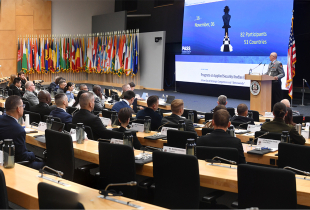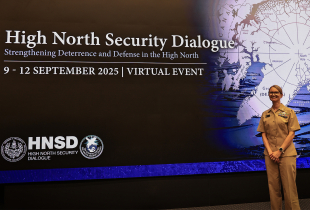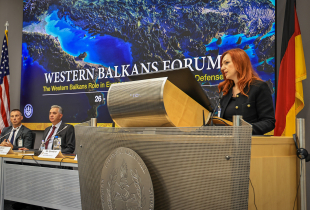
Deputy Commander Multinational Joint HQ ULM Speaks at SRS 15-5 Graduation
By German Air Force Col. Jörg Kunze
Seminar on Regional Security Director
George C. Marshall European Center for Security Studies
GARMISCH-PARTENKIRCHEN, Germany (May 21, 2015) – German air force Maj. Gen. Klaus Habersetzer, chief of staff and deputy commander of the Multinational Joint Headquarters in Ulm, gave his closing remarks May 21 at the graduation of the Seminar on Regional Security resident program at the George C. Marshall European Center for Security Studies.
This year’s SRS had 47 participants from 28 countries, including the Deputy Defense Minister of the Republic of Moldova, Alexandru Cimbriciuc.
Marshall Center’s SRS is a three-week resident program that offers critical insights into the dynamics of crisis management and the mechanisms of conflict resolution. This resident program started April 30 and ended May 21.
The Multinational Joint Headquarters mainly focuses on providing EU, NATO and UN a deployable joint headquarters for operational-level command and control in theatre. In addition, it fulfills the mission of providing a military-strategic headquarters for operations led by the European Union from a fixed installation in Potsdam, Germany.
During peacetime, the MNJHQ plans, coordinates, conducts and evaluates joint exercises. Habersetzer said that “operational-level concept and doctrine development will no longer be a purely national responsibility. Instead, it will be done on a multinational level and, where it is possible, with integrated civilian expertise.”
As of today, 16 EU Member States and NATO Nations are participating in the MNJHQ Ulm plus Germany as Framework Nation. Croatia is expected to join the participating nations, shortly. “We are eager to further enhance multinationality (and) we need to demonstrate that NATO really matters,” Habersetzer said.
Marshall Center’s SRS course design included a wide variety of guest lecturers from the Organization for Security in Europe, defense attachés and military advisors from embassies located in crises facing countries, as well as diplomats and academics that focus on best practices and international approaches to deal with crises management and conflict resolution in Europe and Eurasia.
SRS participants hail from: Albania; Armenia; Azerbaijan; Bosnia and Herzegovina; Bulgaria; Croatia; Czech Republic; Estonia; Georgia; Germany; Hungary; Italy; Kosovo; Kyrgyzstan; Latvia; Lithuania; Macedonia; Moldova; Montenegro; Romania; Serbia; Slovakia; Slovenia; Turkey; Ukraine, United States; and Uzbekistan.
This year’s SRS had a good mixture of participants, who work at defense, interior and foreign ministries, as well as armed forces, law enforcement, and other government agencies.
The seminar is designed for mid-level military (Major to Colonel), civilian government officials and non-government organization representatives who have a relevant background in conflict resolution or will be deployed to crisis regions.
The mission of the Marshall Center, as a vital instrument of German-American cooperation, is to create a more stable security environment by advancing democratic institutions and relationships; promoting active, peaceful, whole-of-government approaches to address transnational and regional security challenges; and creating and enhancing enduring partnerships worldwide.
The Marshall Center offers eight resident programs that examine complex transnational, regional and international security issues: Program on Terrorism and Security Studies; Program on Applied Security Studies; Program on Security Sector Capacity Building; Seminar on Regional Security; Seminar on Transnational Civil Security; CNIT; Program on Cyber Security Studies; and, Senior Executive Seminar.


